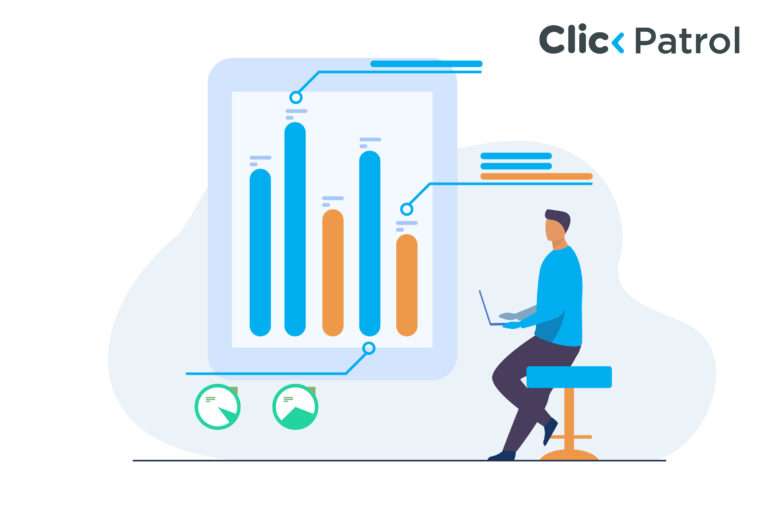
How To Exclude IPs From Google Ads
Abisola Tanzako | May 27, 2024

Should you exclude IPs from Google Ads?
Google Ads has the most robust targeting option compared to other search platforms, but Google Adwords IP exclusion has only sometimes been an option for advertisers. With the increasing rise of Google Ad Fraud, having an IP-blocking feature is a miracle. Ad fraud is also called click fraud or PPC (pay-per-click) fraud- it is simply when a non-genuine user clicks your ad. These clicks can come from click farms, bots, bad ad placement, or competitors.
Table of Contents
These low-quality clicks can be very harmful to your business marketing. They never convert, drain your ad account, cause losses to revenue, and you may lose customers to your competitors. In this article, we will discuss how to block bad IP addresses and why you should block those IP addresses in your Google Ads.
How to Exclude IPs From Google Ads
Here are the steps to follow if you want to block bad IP addresses from your Google account:
- Sign in to your Google Ads account at ads.google.com.
- Click on “Settings” from the left-hand menu.
- Under “Account settings,” click on “IP exclusions.”
- Click on the blue pencil icon to edit the IP exclusions.
- Enter the IP addresses you want to block, separated by commas.
After going through the above process, ensure that you click Save. If not, the exclusion will not be saved. It is also important to exclude certain geographic areas that pose harm through your targeting process, but this may be too broad for most ad campaigns, especially if you have successfully identified harmful IP addresses.
Types IP exclusions
IP exclusions at account-level
Account-level support for IP (Internet Protocol) Exclusions is now available. This can prevent certain IP addresses from viewing your ads on all of your account’s campaigns, including YouTube, Performance Max, Demand Gen, Search, Shopping, Display, and Discover.
Main advantages:
- Simplified control: You can easily block particular IP addresses from viewing your ads in your account’s campaigns, including Performance Max.
- Central management: Campaign management is streamlined by the ability to configure and manage IP exclusions from a single, central location.
- Improved targeting: By carefully regulating where your ads appear, you can make sure the most relevant audiences see them.
How to set account-level IP address exclusion
- Open up your Google Ads account and go to “Settings.”
- On the section menu, select the settings drop-down option.
- Select “Account Settings.”
- Navigate to the “IP exclusions” area.
- If you want certain IP addresses to not see your adverts, enter them here.
- Press Save.
How to eliminate the IP address exclusions at the account level
- Proceed with steps 1-4 above.
- Remove any IP address exclusions if you do not wish to use them.
- Press Save.
IP exclusions at the campaign level
Campaign-level options allow you to exclude certain IP addresses from individual campaigns, although account-level IP exclusions provide a more streamlined solution. This enables you to optimize your targeting and guarantee that your ads are seen by the most relevant audiences within each campaign.
How to exclude IP addresses at the campaign level
- Select the Campaigns icon from your Google Ads account.
- In the section menu, select the Campaigns drop-down option.
- Select Campaigns.
- Choose the campaign from which IP addresses should be excluded.
- Select the Admin Icon under Settings.
- Click Additional Settings on the “Settings” screen.
- Click to expand the “IP exclusions” area.
- Enter the IP addresses you don’t want to see in your adverts.
- Press Save.
How to eliminate the current IP address exclusions at the campaign level
- Observe the preceding steps 1–7.
- If you do not wish to apply any IP address exclusions, remove them.
- Press Save.
Why do you need to Exclude IPs From Google Ads?
Blocking an IP address is a secure measure but also a powerful method of protecting your ads from falling into the hands of bots and non-human traffic. Different situations prompt you to block an IP address:
1. Repetitive clicks
If there is a constant click from specific IP addresses and they are not converting, or better yet, if you see the clicks are coming from a geographical area similar to your competitors, you should block that IPA as soon as possible. As your competitor, they probably use the exact keywords you, use so they know exactly how to trigger your ad campaign and can easily click on it.
2. Bot traffic and click farms.
Bot traffic and click farms are taking fraudulent activities a step further. They hire services that offer to click on ads, it could be clicking on social media accounts, or it could be clicking on PPC ads. Interestingly, these services are not hidden; click bots and farms offer them openly on social media or the web.
As if that wasn’t enough, they are also paid to click (PTC) on various sites that pay remote workers a small amount of money for each ad they watch or click on, bots that can increase a publisher’s payout, and bot traffic that offers to click your competitor out of the search rankings.
These bot traffics, or click farms, can flood your PPC ad campaign so much that it costs you your daily campaign budget and removes you from SERPS for a whole day, which means you lose customers.
3. Brand haters
Unfortunately, some people don’t like your brand. It could be your ex-staff or someone who believes your product and service need to improve. They may dislike your ad style or the fact that you sponsored their rival baseball team.
People are very aware that they have the power to negatively affect a brand by using click fraud to express their rivalry, displeasure, or protest.
4. Ad fraud
This is an organized type of click fraud. Ad fraud occurs when a publisher inflates the traffic on their ad campaign to collect a payout. Usually, fraudsters who manage fake websites and bots operate this and can make thousands every day by siphoning off ad revenue.
Ad fraud can be sneaky with their practices, like hiding videos or displaying ads within an unviewable section of an app or website. They use multiple operating systems or devices to mask their location, usually with VPNs. VPNs typically cycle through different IP addresses, making spotting or blocking these bad IPAs difficult.
What is the difference between excluding and blocking IP Addresses?
Excluding IP addresses blocks the IPA from seeing your ad or visiting your website. However, when it comes to analytics, these terms have different meanings. It would be best to exclude certain IPAs to understand your ad campaign results better. For instance, one of the IP addresses you need to block is your own. Clicks on your webpage, or worse, your ad from your own company, are irrelevant in your analytics and metrics and should be excluded by default.
This also applies to competitors whose IP addresses you have identified. They should be excluded from your analytics results so you can know how your ad campaign is doing. This method helps you manage an exclusion or blacklist of bad IPAs so they won’t be able to click on your Google ad campaign.
Why is manually excluding IPAs ineffective when it comes to click fraud?
Manually excluding IPAs is a great idea, especially if you are particular about blocking occasional IP addresses linked to your workplace, household, or competitor. However, blocking IP addresses manually is not advised when you suspect you are dealing with increased malicious activity, such as click fraud. So why exactly is it a bad idea to block out click fraud with IPA exclusion:
- Click velocity: fraudulent clicks often happen in a moment, with the clicks piling up very quickly. If you are trying to block this by manually excluding the clicks, a massive chunk of the damage would have been done to your campaign before you were done excluding it.
- Time-consuming: going through your blog to discover which IPAs you need to exclude and excluding them can be time-consuming.
- Wasted money: before you identify where the fraudulent activity is coming from, the bot or your competitors would have succeeded in destroying a good portion of your advertising budget.
A more effective and efficient strategy is needed.
How does automatic IP exclusion work?
The automatic IP exclusion includes third-party software such as ClickPatrol, and detecting and blocking fraudulent activities becomes simple. Regarding fraudulent clicks, there are three methods for automatic IP exclusion:
- Monitoring: Automatic IP exclusion adds code to your Google ads and landing pages, allowing the software to collect necessary data points.
- Detecting: after collecting the data, the anti-fraud algorithm can work. Deciding if the IPA is fraudulent or not
- Blocking: After the fraudulent IP address is detected, it is immediately inputted into the AdWords excluded IP list.
Unlike manual solutions, software solutions work much faster than quickly identifying and blocking fraudulent IP addresses before they can do significant harm.
Automated systems save time by removing the need for laborious tracking and identifying suspicious IP addresses. Usually, these solutions can identify fraudulent traffic sources before interacting with your advertisement.
For instance, ClickPatrol has developed a system that integrates to detect suspicious activity despite unclear patterns. Additionally, it guarantees that you aren’t blocking actual users. Automated click fraud detection software can also recognize and block sophisticated bots and click farms. It is well known that these organizations frequently conceal their real locations using VPNs and proxies. Even though it can be challenging to recognize fraudulent IP addresses that change regularly, sophisticated click fraud detection software can nonetheless recognize and successfully block them.
Conclusion
Whether you manually exclude an IP address or use ClickPatrol, The most important question would be why you are blocking the IP and what velocity you are dealing with. It is not unreasonable to assume that businesses like yours are bidding for the same keyword as yours and clicking on your ads. If you belong to an industry with competitive keywords, check the unwanted clicks you receive. This way, you can decide whether to block those IPAs from now on. Blocking them is an excellent method of boosting the performance of your ads and, overall, your business.
FAQs
Q1 When recognising IP addresses, what are some common suspicious patterns to look out for?
If you monitor the analytics of your ads campaign regularly, you may notice a few recurring patterns that suggest one or more IP addresses may be connected to suspicious activities. Keep an eye out for the following patterns:
- Elevated click-through rates (CTR)
- Multiple clicks from the same IP address
- Multiple clicks from a limited number of IP addresses
- Suspicious click-through increases that often happen at the same time every day
- Unusual user or device behaviours, such as clicking without moving the mouse
If you observe any of these patterns, you may need to ban certain IP addresses to lessen the impact of fraudulent activities.
Q2 Does blocking IP addresses impact my ad’s performance?
Blocking IP addresses can be a helpful tool for improving your ad performance, but it’s important to use it carefully. Blocking invalid traffic, such as clicks from bots or competitors, can lead to a better click-through rate (CTR), conversion rate, and cost-per-click (CPC).
However, blocking legitimate traffic is risky if you don’t do it carefully. Only block IP addresses that you’re sure are invalid or unwanted. If you’re unsure whether or not to block a certain IP address, consider using a third-party tool to help you identify and block invalid traffic.
Q3 If I unintentionally block a legitimate IP address, what happens?
Blocking a legitimate IP address in Google Ads can be almost unavoidable and have unexpected outcomes such as reduced ad reach and lost opportunities to acquire new clients. You can change this in your Google Ads settings and take the IP address off the exclusion list if you believe you have blacklisted a valid user’s IP address.

